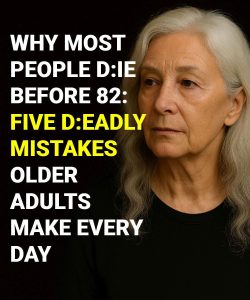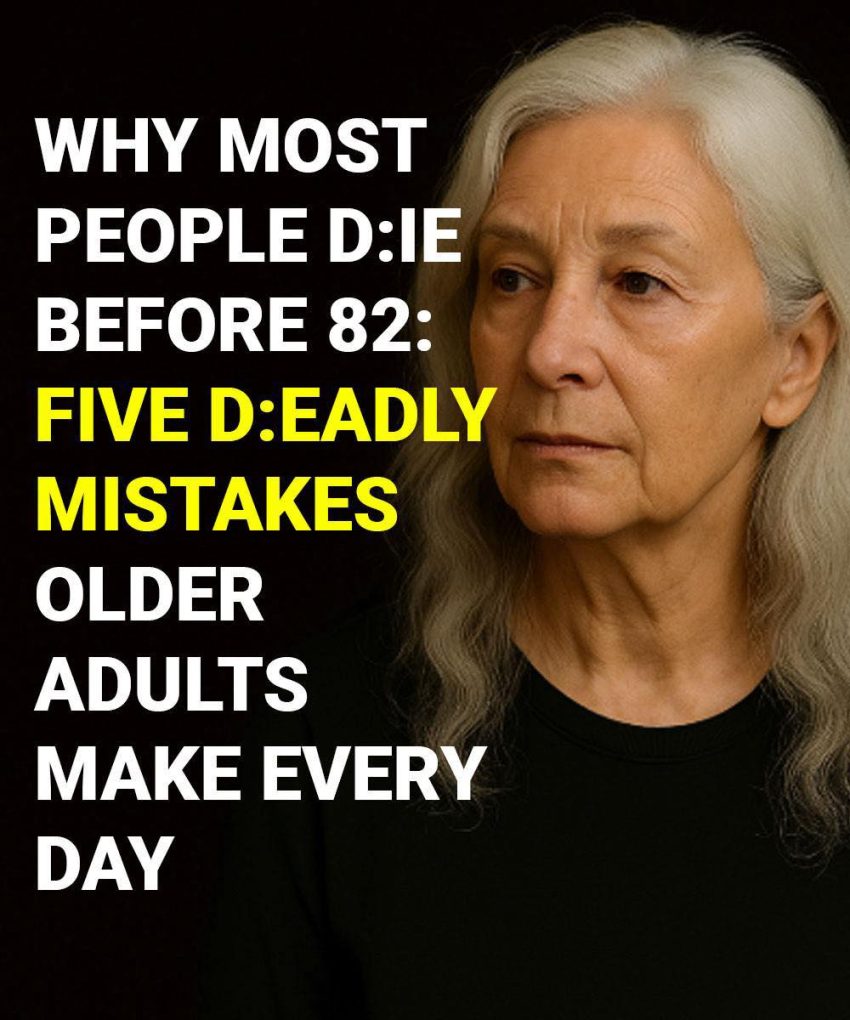These days, more people than ever are living longer. The average life expectancy in the world is already well into the 70s, and in some countries, it is even higher. This is because of better living conditions and advances in medicine.
But the unfortunate truth is that many people don’t live past 82. That number is frequently significantly lower for older people in the U.S.
What scares me the most? Sometimes it’s not disease or genetics that cut life short; it’s just little mistakes. Even habits that don’t seem bad can slowly undermine your health and freedom.
The good news is that you can stop things from happening. If you’re over 60 and want to age older with strength, energy, and clarity, here are five common health mistakes that could be costing you years and what you could do instead.

1. Sitting Too Much—The “Silent Killer” of Long Life
It’s a prevalent myth that you should always rest as you become older.
It’s true that your body needs time to heal, but sitting around for a long period can make things worse. Older people who sit for most of the day are far more likely to
Weakness and loss of muscle
Problems with the heart
Type 2 diabetes
Depression and a decline in mental clarity
Sitting too much can also make you fall, which is one of the most common ways for older individuals to damage themselves.
What You Can Do Instead:
Every day, walk for 20 minutes. Going around the block is still exercise.
Do some gentle exercise, such stretching on a chair, tai chi, or yoga.
You can be active by doing tasks around the house, such folding laundry, cleaning up, or gardening.
Every hour, set a timer on your fitness tracker to remind you to get up and move.
Being active doesn’t mean getting ready for a marathon; it just means moving your body.
2. Eating like you’re still 40
As you become older, your body’s dietary needs change.
Many elderly adults still eat the same foods they did when they were in their middle years: frozen dinners with a lot of salt, sugary snacks, processed meats, and not enough fresh fruits and vegetables. But your metabolism slows down, and you need additional vitamins and minerals.
This can make you fatigued, make your immune system weaker, give you gastrointestinal problems, and even make you forget things.
What You Can Do Instead:
Eat whole foods like fruits, vegetables, nuts, legumes, and whole grains.
Eat less red meat, salt, sugar, and processed meals.
Drink water before you get thirsty.
Your doctor should tell you to take vitamins.
Think of food as a form of medicine. Every diet should benefit your heart, bones, brain, and general health.
3. Not hanging out with buddies

It’s normal to feel increasingly alone as you get older. Friends leave, driving gets harder, and health difficulties get in the way.
But being alone is one of the most hazardous and neglected threats to your health. It makes you more likely to have heart disease, lose your memory, or feel sad or anxious. Research shows that being lonely all the time might be just as detrimental for your health as smoking 15 cigarettes a day.
What You Can Do Instead:
Call your friends and relatives to stay in touch.
Join a church group, a senior center, or a hobby club.
Do something kind for others by volunteering. It will help you feel better and keep you active.
If you live alone or far away from family and friends, you can utilize Zoom or FaceTime to keep in touch.
Two small actions that can help you feel better and stay healthy include talking to a neighbor or smiling at someone in the store.
4. Not caring about your mental health
A lot of older individuals think that being sad, worried, or irritable is just a typical part of becoming older. But that’s not correct.
Anyone can have mental health problems, and emotional health is just as important as physical health. If you don’t get help for things like depression and chronic stress, they might make your life worse and maybe even end it.
Instead, you may talk to a friend, family member, doctor, or therapist.
Reading, doing puzzles, and learning something new are all great methods to keep your mind engaged.
Write down a few things that make you joyful every day.
Do something you enjoy, like gardening, sketching, baking, or taking walks in nature.
Mental health deserves the same amount of care and attention as any other health problem. It’s okay and important to ask for help if something feels “off.”
5. Not going to the doctor on a regular basis
“I don’t need to see the doctor if I’m not in pain.”
A lot of older people believe this line, and it’s one of the worst things you can do for your health.
Some diseases, like high blood pressure, diabetes, and some cancers, can get worse without any obvious indicators. This is why getting regular tests is the greatest approach to keep yourself safe.
Instead, you should go to the doctor at least twice a year for a check-up.
Get blood tests on a regular basis, especially to check your cholesterol, blood sugar, and how well your kidneys are operating.
Do what your doctor says and make sure you have checkups for your heart and cancer, like mammograms and colonoscopies.
Follow your doctor’s advice, which could mean taking medicine, changing your way of living, or consulting a specialist.
Finding things early can save lives. Don’t wait till things go wrong.
You can now live longer and better.
You don’t have to make significant adjustments to your life to make it longer and more enjoyable.
You only need to be aware, take action, and be open to changing patterns that aren’t working for you anymore.
It doesn’t have to mean slowing down, withering away, or feeling like your finest years are behind you when you get older.
You are making your future health and happiness better by doing things like going for a brisk walk, eating a healthy meal, phoning a friend, or going to the doctor every day.
Start with small steps. Be steady. And don’t forget to get some exercise every day.
Don’t just eat to fill yourself; eat to stay healthy.
Be around the individuals you care about.
Be aware of how you feel.
Get checked out before something bad happens.
After 60, it’s not about counting the years; it’s about making the years count.
